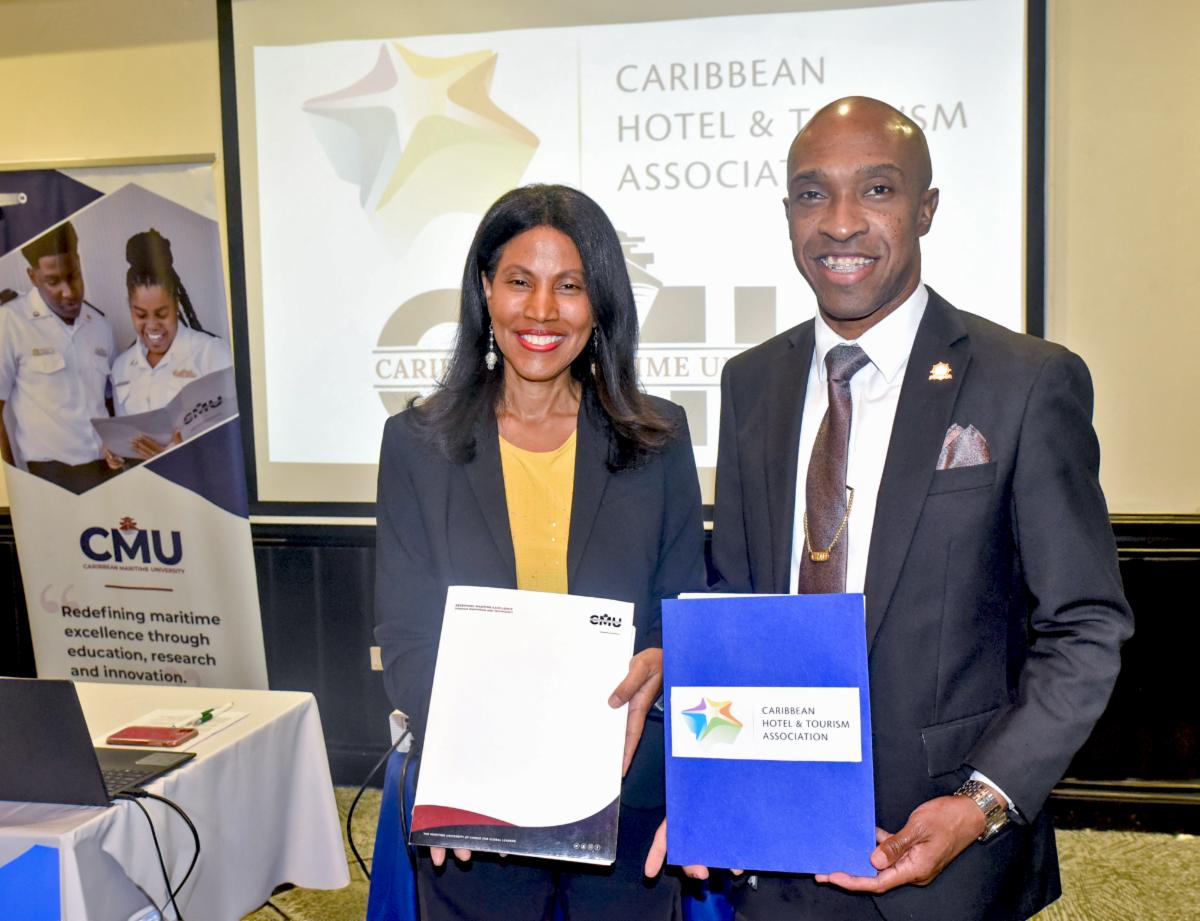CHTA and CMU Join Forces to Strengthen the Region’s Tourism Sector
KINGSTON, Jamaica (February 4, 2024) – The Caribbean Hotel and Tourism Association (CHTA) has formalized a significant partnership with the Caribbean Maritime University (CMU) through the signing of a memorandum of understanding (MOU). This collaborative effort aims to enhance the skill levels of people working within the region’s dynamic tourism sector.
Nicola Madden-Greig, OD, president of the CHTA, emphasized, at the signing of the MOU, the critical need for strategic alliances in addressing the challenges that threaten the resilience and sustainability of the region’s tourism landscape. She underscored the pivotal role of organizations like the CMU in equipping tourism practitioners with the necessary tools to navigate evolving industry dynamics.
Reflecting on the lessons learned during the pandemic, Madden-Greig highlighted the value of cohesive regional cooperation and stressed the growing importance of collaborative endeavors between stakeholder groups such as CHTA and CMU.
While acknowledging the region’s commendable recovery from the impacts of COVID-19, the CHTA president expressed concern regarding labor market constraints and the development of skills to meet the expectations of a new breed of travelers. Additionally, she underscored the need to address the challenges posed by technological advancements, including artificial intelligence.
Madden-Greig lauded CMU for its impactful research initiatives, education and training programs, which have heightened awareness of academia, industry, governments, multilateral organizations, and the general public regarding the importance of implementing standards, training, policies, and initiatives that advance best practices within the industry.
The collaboration between CMU and CHTA will encompass a diverse range of educational, training, research and policy-related activities aimed at engaging the Caribbean tourism sector. Key focus areas will include leadership, workforce digitalization, sustainability and environmental practices, marine safety, crisis management, and sharing research findings and knowledge. As one of its first initiatives, CMU students will support the execution of CHTA’s Caribbean Travel Marketplace, the region’s premier travel trade show, taking place in Montego Bay, Jamaica, May 21-23, 2024.
Through collaboration, she said, the organizations look forward to stimulating more direct action by the industry and advancing policies that move the region towards achieving the World Travel & Tourism Council projection of a doubling of GDP and creating an estimated 1.34 million jobs by 2032.
Professor Andrew Spencer, President of the Caribbean Maritime University, expressed his enthusiasm for the expanded vision embodied by the collaboration, emphasizing the university’s commitment to elevating and reshaping the labor force to propel Caribbean tourism to new heights.
He welcomed the MOU’s potential to broaden the university’s scope beyond its maritime-centered focus, primarily in areas such as management and supervisor training within the hospitality and tourism domains. Furthermore, he highlighted the university’s intent to integrate considerations for water sports, marine environment sustainability, and opportunities for workforce digitalization.
Professor Spencer declared his intention to change the ethos of individuals working in tourism so that they appreciate the sector’s value.
With CHTA’s 500 members in 30 destinations, coupled with the university’s 3,000 students and faculty equipped with technology and knowledge that can drive and transform industries, the collaboration will be a powerful game-changer for Caribbean tourism, as well as for the maritime sector, and for the overall growth and development of a region which “desperately needs it.”
He anticipated that every one of the MOU’s three years would yield significant strides and massive gains toward the ultimate aim of transforming the Caribbean region for greater economic development.
